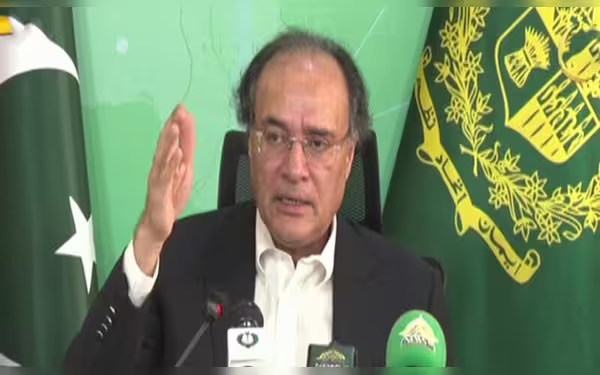Friday, October 4, 2024 12:26 PM
Tax Filers Surge in Pakistan Under New Reforms
- Tax filers nearly doubled in current fiscal year.
- Government implements strict measures against non-filers.
- Inflation decreases as IMF program progresses.
 Image Credits: dawn
Image Credits: dawnFinance Minister Aurangzeb announces a significant increase in tax filers in Pakistan, highlighting new reforms and measures against non-compliance.
In a significant development for Pakistan's economy, Finance Minister Muhammad Aurangzeb announced that the number of tax filers has nearly doubled in the current fiscal year compared to the previous year. This surge in tax registrations, with around 723,000 new filers, comes as part of the government's ongoing efforts to enhance tax compliance and enforcement. The Prime Minister, Shehbaz Sharif, recently approved stringent measures aimed at non-filers, including a ban on banking and financial transactions for those who do not submit tax returns.
During a press conference in Islamabad, Aurangzeb emphasized the government's commitment to "walking the talk" regarding tax reforms. He revealed that the Federal Board of Revenue (FBR) had presented a report detailing the issues of non-filers and underfilers, estimating that tax evasion among individuals who underreport their income amounts to a staggering Rs1.3 trillion. The finance minister stated, "I think I’ve already talked about that we have to declare war on cash in this country," highlighting the need for a documented economy.
With cash in circulation estimated at around Rs9 trillion and the FBR's budget set at Rs9.3 trillion, Aurangzeb suggested that the actual size of Pakistan's economy could exceed $700 billion. He warned non-filers that they would face significant challenges in purchasing vehicles, properties, and mutual funds, as well as difficulties in opening current bank accounts and making cash withdrawals. To address the issue of underfiling, the government plans to reduce human intervention by implementing a digital interface that will use algorithms to compare declared income with actual asset values.
"Look, this data was always there with us," Aurangzeb stated, referring to the lifestyle data that tracks individuals' assets and expenditures. He emphasized that the government is now focused on utilizing this data effectively to improve the tax-to-GDP ratio. This approach aims to protect citizens' rights by preventing tax collectors from harassing them.
On the topic of inflation, the finance minister noted that it has decreased to single digits and is expected to "subside more," attributing this positive trend to the successful completion of a stand-by agreement with the International Monetary Fund (IMF). Aurangzeb highlighted the importance of a new and extended IMF program to ensure macroeconomic stability and facilitate structural reforms in the country. The IMF Executive Board recently approved a 37-month $7 billion Extended Fund Facility, which is the 24th payout since 1958, in exchange for necessary but unpopular reforms, including broadening the tax base.
Both the Prime Minister and the Finance Minister have previously stated that this will be the last IMF program Pakistan undertakes. During the press conference, Aurangzeb reiterated this assertion, emphasizing the critical need for macroeconomic stability to make this a reality. He remarked, "Because this isn’t a theory anymore, we are seeing the results of this macroeconomic stability," while also noting that reforms in the energy sector and privatization efforts are underway.
In terms of rightsizing the government, Aurangzeb revealed that six ministries are currently being ratified to reduce federal expenditures, with one ministry, the Capital Authority, set to be abolished. This move is part of a broader strategy to streamline government operations and enhance fiscal responsibility.
The doubling of tax filers in Pakistan is a promising sign of progress in the government's efforts to improve tax compliance and strengthen the economy. As the country navigates through these reforms, it is crucial for citizens to understand the importance of their role in contributing to the national economy. By embracing a culture of tax compliance, individuals not only fulfill their civic duties but also help pave the way for a more stable and prosperous future for Pakistan.













